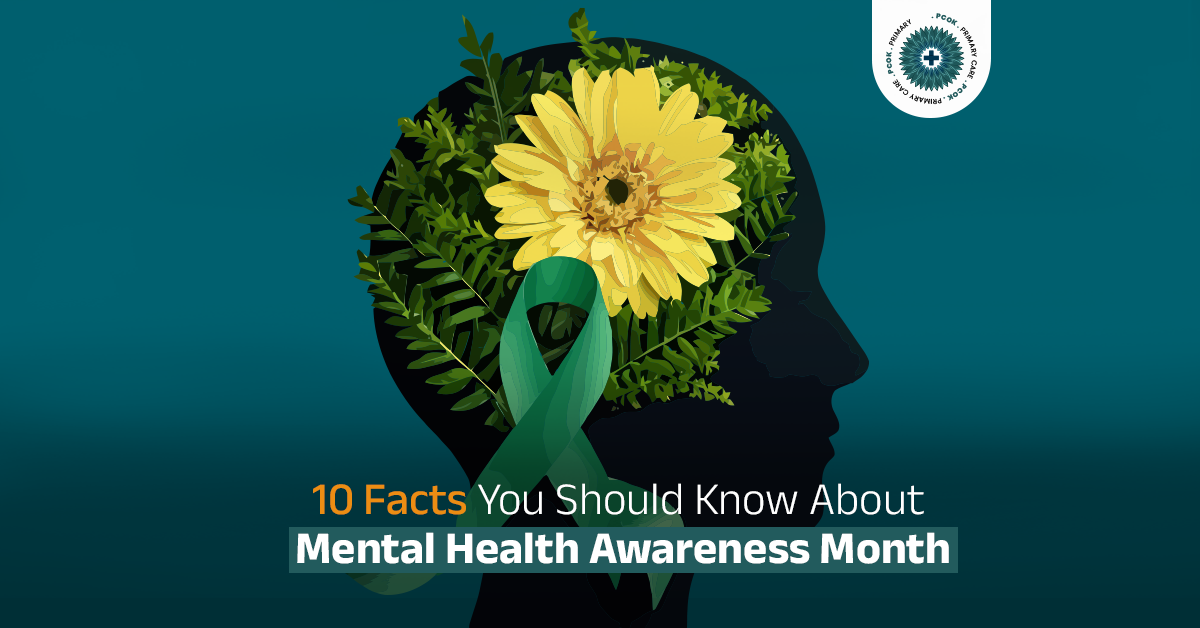Mental wellness matters as much as physical condition. We receive support for a cold or injured arm, so it’s permissible to ask for help when we feel down, troubled, or strained.
May is Mental Health Awareness Month a time to assist each other and convey stories.
At Primary Care of Kansas, we focus on compassionate, evidence-based mental health care. Your emotional and psychological well-being is our top priority.
Below are 10 essential and supportive facts to know during this vital month of awareness.
10 Facts About Mental Health Awareness Month
-
It Started Over 70 Years Ago
Mental Health Awareness Month began in the United States in 1949. It was initiated to educate people about mental wellness and reduce stigma.
At Primary Care of Kansas, we uphold this mission year-round by offering evidence-based mental health services tailored to your needs.
-
Mental Illnesses Range from Mild to Severe
Mental health conditions fall into two categories: Any Mental Illness (AMI) and Serious Mental Illness (SMI). AMI covers all mental, emotional, and behavioral disorders. SMI, on the other hand, greatly disrupts major life activities.
At Primary Care of Kansas, our professionals provide individualized support whether you’re facing mild anxiety or a complex disorder. Every concern is valid, and every person deserves support.
-
Green Is the Color of Mental Health Awareness
You might see people wearing green in May. That’s because green is the shade associated with promoting mental health awareness and the belief in healing.
-
Mental Illness Is Very Common
About 1 in 8 people globally live with a mental health disorder. In the United States, more than 59.3 million adults, or roughly 1 in 5 adults (23.1%), have a mental illness, mostly anxiety and depression, which are treatable.
Primary Care of Kansas’s team offers personalized counseling and medication management to help you regain balance and clarity.
-
Mental Health Issues Often Start Young
Mental health challenges can surface in the formative years or the teenage period. Over 20% of youth in the United States have dealt with a major mental health concern. Early support can make a big difference.
-
Women Are More Likely to Experience and Treat Mental Illness
Statistically, 26.4% of women experience AMI compared to men. Women are also more likely to seek treatment, often benefitting from the therapeutic and medical services we offer at Primary Care of Kansas, such as counseling, CBT, DBT, and medication management.
-
The Pandemic Made Things Worse
At the high levels, inflammation of depression and anxiety intensified during COVID-19. Many experienced loneliness, stress, or dread. This greatly affected mental health across the globe.
-
Suicide Is a Leading Cause of Death Among Youth
Statistics show that suicide is one of the three most significant mortality for the population of people between the ages of 15 and 29 years. It is for this reason that early attention and help, as well as talking about it, must be encouraged and provided.
-
Many People Still Struggle to Get Help
In 2022, 66.7% of adults with SMI got treatment. However, only 50.6% of those with AMI received care. This difference points to barriers such as stigma, limited access, high costs, and a shortage of mental health resources.
-
The 2025 Theme: “Where to Start”
Mental Health America’s 2025 theme aims to help people figure out where to start in caring for their mental health. In an ever-changing world, it is all right not to have everything figured out. What matters is taking some initiative.
Campaigns such as “Turn Awareness into Action” will engage individuals, organizations, and communities to know the practical steps and tools for making change real and meaningful.
How Can You Support Mental Health Month?
- Engage in dialogues with friends and relatives about emotional health. Dialogue about the essentiality of breaking the mold.
- Learn about mental health from the available resources or talk to a professional about their duties.
- Make time for family and friends who would like to share their mental health issues with you.
- Share your own story! In case you coexist with a psychological disorder, your stories can support others dealing with comparable difficulties.
Final Thoughts
Mental Health Awareness Month reminds us that mental health is a health.
By learning and sharing, stigma can be reduced and support given to those who need it. Then, it builds a more caring and strong community.
If you or someone you know is struggling, remember that help is available. Reaching out shows strength.
At Primary Care of Kansas, we offer specialized mental health support with empathy. From support to medication coordination, we are equipped to help you feel your top. Contact us to schedule your appointment.
FAQs
Why is suicide prevention part of this conversation?
Because untreated mental health struggles can lead to thoughts of self-harm, awareness builds hope, prevents, and connects.
Do mental health problems only affect adults?
There is no age limit to mental health problems. Among adolescents in the United States, one in five has a serious diagnosable mental disorder. It is even better if they seek assistance in the shortest time possible.


No comment